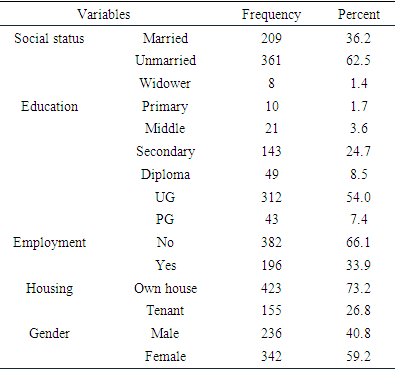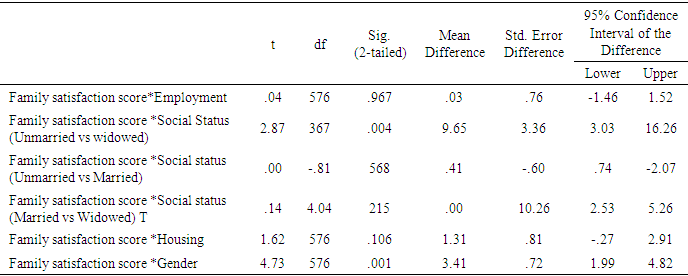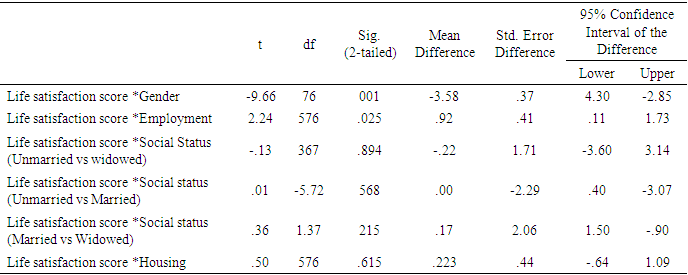-
Paper Information
- Next Paper
- Paper Submission
-
Journal Information
- About This Journal
- Editorial Board
- Current Issue
- Archive
- Author Guidelines
- Contact Us
International Journal of Psychology and Behavioral Sciences
p-ISSN: 2163-1948 e-ISSN: 2163-1956
2022; 12(1): 5-9
doi:10.5923/j.ijpbs.20221201.02
Received: Feb. 14, 2022; Accepted: Mar. 18, 2022; Published: May 24, 2022

The Levels and Relationships of Family and Life Satisfaction Among Saud Arabian - A Cross Sectional Study During Covid 19 Pandemic
Dushad Ram1, Saleh Abdulaziz Al-Zahrani2, Mutaab Ali Alshehri3
1Department of Medicine, College of Medicine, Shaqra University, Shaqra, Saudi Arabia
2Department of Psychology, Shaqra University, Shaqra, Saudi Arabia
3Department of Graduate Studies and Scientific Research, Shaqra University, Shaqra, Saudi Arabia
Correspondence to: Dushad Ram, Department of Medicine, College of Medicine, Shaqra University, Shaqra, Saudi Arabia.
| Email: |  |
Copyright © 2022 The Author(s). Published by Scientific & Academic Publishing.
This work is licensed under the Creative Commons Attribution International License (CC BY).
http://creativecommons.org/licenses/by/4.0/

The Covid 19 pandemic affected psychosocial aspect of individuals that can affect the levels of family and life satisfaction. So far, there is paucity of study examining family in Arabic country. Thisstudy was conducted to know the levels and relationships offamily and life satisfaction during Covid 19 pandemic in Saudi Arabia. In this cross-sectional community-based study a total of 578 subject were assessed with sociodemographic proforma, Family Satisfaction Scale, and Satisfaction with Life Scale. Results reveals the mean score onFamily Satisfaction Scale and Satisfaction with Life Scale to be 38.98 (SD=8.66) and 18.60 (SD=4.71) respectively. There was a statistically significant group difference on score of Family satisfaction score by gender and marital status, as well as on life satisfaction score by gender and employment status. Value on score of family satisfaction was statistically significant positively predicted the value on score of life satisfaction. With the finding of the study, it may be concluded that family satisfaction and life satisfaction are positively linked during Covid 19 pandemic.
Keywords: Pandemic, Family satisfaction, Life satisfaction, Saudi Arabia
Cite this paper: Dushad Ram, Saleh Abdulaziz Al-Zahrani, Mutaab Ali Alshehri, The Levels and Relationships of Family and Life Satisfaction Among Saud Arabian - A Cross Sectional Study During Covid 19 Pandemic, International Journal of Psychology and Behavioral Sciences, Vol. 12 No. 1, 2022, pp. 5-9. doi: 10.5923/j.ijpbs.20221201.02.
Article Outline
1. Introduction
- The Covid 19 pandemic significantly affected psychosocial aspect of life of Saudis due to the necessary measures required to contained dissemination such as physical distancing and isolation. Report reveals that 42.25% experience psychological difficulties, 64.4% had social difficulties and 51% had economic difficulty; particularly for women, aged and those having illnesses [1]. Family function also affected due to this pandemic [2]. Family satisfaction and life satisfactions are also appearing to be affected by pandemic. Family satisfaction is the level of positive evaluation that the individual gives to his family; and conceptualized in variety of ways such as individual perceptions, dyadic relationships (e.g., marital, sibling), and more global attributes of the family system [3]. Family satisfaction depends on multiple family function such as adaptation, partnership, growth, affection and resolve [4], and are likely to be influenced by pandemic. A study reported that during pandemic 93.1% were satisfied with their families [5]. Among Saudi students males had higher family satisfaction [6]. So far, we could not find any study examining these variables in this pandemic in general Saudi Population.Life satisfaction is how an individual evaluates their life as being positive in accordance with their own criteria, and is highly correlate with wellbeing [7]. It is often determined by family life satisfaction, friendship and relationships with other [8], that are affected during pandemic. Among Chinese population the variables affected the life satisfaction were severity of COVID-19 in an individual's home city [9], Psychological distress [10], and levels of self-compassion [11]. Among Turkish Life satisfaction positively linked to resilience [12]. Life satisfaction negatively correlated to internet used related sleep disturbance among Palestinian [13]. Among Ethiopian, the females belonging to the rural area had higher life satisfaction than males [14]. Among Saudi student female had more life satisfaction during pandemic [6]. So far, no study examined life satisfaction in general population of Saudi Arabian.The family satisfaction are linked to life satisfaction [15,16]. In multicentric study decreases in social activity through family, friends/neighbors, or entertainment were associated with lower life satisfaction during the confinement period [17]. There needs to ascertain whether such relationship exist in Saudi Population as well, and such information would help develop strategy to overcome negative impacts. Thus, this study was conducted to know the levels and relationships of family and life satisfaction during Covid 19 pandemic. We hypothesized that there will be a positive link.
2. Material and Methods
- In this cross-sectional study was conducted among people of Al Shaqra, after approval from Institutional Ethics Committee. an online google form was used to collect data. A link was sent to the WhatsApp. The google form does not contain the personal identification of respondents, and it was mentioned that they have the right not to participate in this study. After consent, the participant can respond to the items on the google form. The study started on 02/02/2020 and ended on 31/03/2020. Inclusion criteria of this study were resident of Saudi Arabia aged 18 or more. Exclusion criteria were history of any chronic mental illness or debilitating physical illness.A total of 578 responses were received by the stipulated time, who met the selection criteria of this study and were included. The tools of assessment were –Demographic proforma: This proforma consisted of age, gender, social status, education, employment status, and housing.The Family Satisfaction Scale: This 10 items Arabic language scale was developed by Al-Zahrani [18]. The scale is based on the concept developed by Veenhoven et al., in 1996 [19]. It consisted of 5 point scale (1 to 5), where the number (1) indicates dissatisfaction, and number (5) to total satisfaction. Possible minimum score is 10 while maximum score is 50. Internal consistency was .89 and validity of .88. Low score indicates poor satisfaction while high score indicates high satisfaction. The scale has been used in Saudi Population. Satisfaction with Life Scale (SWLS): Diener et al. developed these 5 items, self-report, Likert scale (1 = strongly disagree to 7 = strongly agree), with possible scale range from 5–35 [7]. A score below 20 indicates low satisfaction while a higher score indicates more satisfaction. The reliability score ranged from 0.79 to 0.89 and had a good validity score. The scale has been used among Saudi Arabia [20].Statistical analysis was done with IBM SPSS vs 25. Descriptive statistics were used to analyses demographic characteristics. Independent T test was done to examine the score of measures on family and life satisfaction by demographic variables. A Linear regression analysis was done to know if value on score of family satisfaction can predict the value on score of life satisfaction.
3. Results
- The sociodemographic feature was characterized by majority being female, unmarried, secondary educated, unemployed or students, having own house (Table: 1A). Mean age was 27.63 years, while mean score on life satisfaction scale and family satisfaction scale were 18.6 and 38.98 respectively (Table 1B).
|
|
|
|
|
4. Discussion
- This study aimed to examine the relationships of family satisfaction with life satisfaction during Covid 19 pandemic in Saudi Arabia. Result revealed that widowed had low family satisfaction than currently married and being male. There is no report from Saudi Arabia examining this variable in general population to compare. Social network help family to build enjoyable family leisure, stay connected and increase sense of belonging [21]. Family communication play an important role in satisfaction [22]. There is paucity of literature from Saudi Arabia to compare. Males in the Middle East (with a collective cultural context) recognize the family as the primary source of support and needs in general, in the context of the Corona pandemic and under the weight of stone procedures in particular [23].Female and those with an employment had more life satisfaction. It is similar to observation by worrier et al, who observed among married students to have better life satisfaction [24]. Married and female status reportedly may have better life satisfaction among health professional trainee [20], though another report could not corroborate [25]. In older age also gender differences is been reported on the measure of life satisfaction [26]. However, report from non-arabic country did not observed any gender difference [27]. Report reveals that job may have positive causal influence to life satisfaction among Saudi [28].Major finding of the study is a significant positive link of family satisfaction with life satisfaction. Family satisfaction with life can be determined by the family's understanding of responsibilities, roles, and various tasks and their difficulties in reaching an adequate level of family functioning, which will directly influence the quality of life [29]. Individuals who evaluate their family functioning as cohesive, flexible, communicative, and fulfilled, are more likely to process their own emotions and enjoy higher life satisfaction. Conversely, assessment of family of origin as disengaged and chaotic may diminish the ability to manage one’s own emotions, which, in turn, can lead to lower life satisfaction [16]. Among Netherlands and the US population social contacts and family have the highest impact on global life satisfaction [30]. Similarly, among German satisfaction with family relationships and life achievement is correlated with feelings of love and number of social contacts [31].
5. Conclusions
- With the finding of the study, it may be concluded that family satisfaction and life satisfaction are positively linked during Covid 19 pandemic. However, the result should be interpreted with caution it was web-based study, relying on snowball sampling, and inability to determine the response rate and any details of non-responders. Being initial study, further study is needed to confirm the finding.
Declarations
- Ethics approval and consent to participate: Approval was obtained from institutional ethics committee before study and consent was obtained from participant.Consent for publication: consent for publication was obtained from participant.Availability of data and material: The data are available from the corresponding author on reasonable request.
Abbreviations
- COVID 19: coronavirus disease of 2019
 Abstract
Abstract Reference
Reference Full-Text PDF
Full-Text PDF Full-text HTML
Full-text HTML



